|
Books Should Be Free Loyal Books Free Public Domain Audiobooks & eBook Downloads |
|
|
Books Should Be Free Loyal Books Free Public Domain Audiobooks & eBook Downloads |
|
Fiction |
|---|
|
Book type:
Sort by:
View by:
|
By: Peter Newell (1862-1924) | |
|---|---|
 The Slant Book
The Slant Book
The Slant Book is literally the shape of a parallelogram, with the spine of the book running down one side. When opened, facing pages form a “V” shape. All the pictures on the slanted recto pages show a way-too-precocious infant in a carriage [the "go-cart" of yesteryear] racing downhill who has somehow gotten away from his nanny, gleefully creating havoc all along the way! The facing verso pages contain two stanzas of commentary on the charming –if alarming!– illustrations. This book pioneered the “special format” children’s literature of today, such as pop-up books or cutout books like Eric Carle’s The Very Hungry Caterpillar... | |
 The Rocket Book
The Rocket Book
The Rocket Book begins when the son of a building superintendent sets a match to a rocket he discovered in the basement. Suddenly, the rocket blasts its way up through apartment after apartment in a high-rise, disrupting and transforming the humdrum goings-on of twenty families till it is finally stopped cold by something in the attic. An elliptical hole is punched in each of the book’s pages and illustrations to signify where the rocket passed through every apartment! As in all of Newell’s books, the verse on the verso-page provides commentary on the recto-page illustration... | |
By: Katherine Pyle (1863-1938) | |
|---|---|
 The Counterpane Fairy
The Counterpane Fairy
A little boy, recuperating from a lengthy illness, is entertained by visits from the Counterpane Fairy, who treats him to stories associated with each of the squares in the counterpane (quilt) on his sickbed. She has him concentrate on one of the squares until it turns into something like a doorway into the story. Once inside the story, he becomes its lead character until it fades out as if he’s awakening from a dream. | |
By: Marcus Tullius Cicero | |
|---|---|
 The Philippics
The Philippics
A philippic is a fiery, damning speech delivered to condemn a particular political actor. The term originates with Demosthenes, who delivered an attack on Philip II of Macedon in the 4th century BCE.Cicero consciously modeled his own attacks on Mark Antony, in 44 BC and 43 BC, on Demosthenes’s speeches, and if the correspondence between M. Brutus and Cicero are genuine [ad Brut. ii 3.4, ii 4.2], at least the fifth and seventh speeches were referred to as the Philippics in Cicero’s time. They were also called the Antonian Orations by Aulus Gellius... | |
By: Giles Lytton Strachey (1880-1932) | |
|---|---|
 Eminent Victorians
Eminent Victorians
On Modern Library's list of 100 Best Non-Fiction books, "Eminent Victorians" marked an epoch in the art of biography; it also helped to crack the old myths of high Victorianism and to usher in a new spirit by which chauvinism, hypocrisy and the stiff upper lip were debunked. In it, Strachey cleverly exposes the self-seeking ambitions of Cardinal Manning and the manipulative, neurotic Florence Nightingale; and in his essays on Dr Arnold and General Gordon, his quarries are not only his subjects but also the public-school system and the whole structure of nineteenth-century liberal values. | |
By: Amy Steedman | |
|---|---|
 David the Shepherd Boy
David the Shepherd Boy
| |
By: Irwin Leslie Gordon (1888-1954) | |
|---|---|
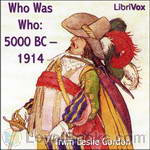 Who Was Who: 5000 BC – 1914
Who Was Who: 5000 BC – 1914
A short, humorous biography of famous people from 5000 BC to 1914. — S. McGaughey From the Introduction, “The editor begs leave to inform the public that only persons who can produce proper evidence of their demise will be admitted to Who Was Who. Press Agent notices or complimentary comments are absolutely excluded, and those offering to pay for the insertion of names will be prosecuted. As persons become eligible they will be included without solicitation, while the pages will be expurgated of others should good luck warrant.” | |
By: Haggard, H. Rider (1856-1925) | |
|---|---|
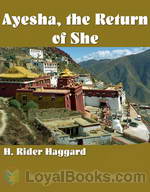 Ayesha, the Return of She
Ayesha, the Return of She
Ayesha, the return of She, is set 16 years after the previous novel She. Horace Holly and Leo Vincey have spent the years travelling the world looking for Ayesha, along the way they experience many adventures, including avalanches, glaciers and even death-hounds before finally arriving in the court of Kaloon. At the court, they hear tell of a woman who Leo suspects to be Ayesha, however things are never simple and conflict soon follows them to Ayesha’s court. (Summarised from Wikipedia) | |
By: Samuel Johnson (1709-1784) | |
|---|---|
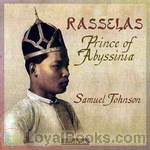 Rasselas, Prince of Abyssinia
Rasselas, Prince of Abyssinia
In this enchanting fable (subtitled The Choice of Life), Rasselas and his retinue burrow their way out of the totalitarian paradise of the Happy Valley in search of that triad of eighteenth-century aspiration – life, liberty and happiness.According to that quirky authority, James Boswell, Johnson penned his only work of prose fiction in a handful of days to cover the cost of his mother’s funeral. The stylistic elegance of the book and its wide-ranging philosophical concerns give no hint of haste or superficiality... | |
By: Christopher Marlowe (1564-1593) | |
|---|---|
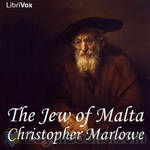 The Jew of Malta
The Jew of Malta
Christopher “Kit” Marlowe (baptised 26 February 1564 – 30 May 1593) was an English dramatist, poet, and translator of the Elizabethan era. The foremost Elizabethan tragedian before William Shakespeare, he is known for his magnificent blank verse, his overreaching protagonists, and his own untimely death. The Jew of Malta (1589) is an original story of religious conflict, intrigue, and revenge, set against a backdrop of the struggle for supremacy between Spain and the Ottoman Empire in the Mediterranean... | |
By: Tom Godwin (1915-1980) | |
|---|---|
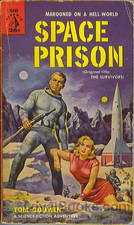 Space Prison
Space Prison
AFTER TWO CENTURIES….The sound came swiftly nearer, rising in pitch and swelling in volume. Then it broke through the clouds, tall and black and beautifully deadly — the Gern battle cruiser, come to seek them out and destroy them. Humbolt dropped inside the stockade, exulting. For two hundred years his people had been waiting for the chance to fight the mighty Gern Empire … with bows and arrows against blasters and bombs! | |
 Cry from a Far Planet
Cry from a Far Planet
| |
By: Samuel Richardson | |
|---|---|
 Pamela, or Virtue Rewarded
Pamela, or Virtue Rewarded
Now first Published In order to cultivate the Principles of Virtue and Religion in the Minds of the YOUTH of BOTH SEXES.A Narrative which has its Foundation in TRUTH and NATURE; and at the same time that it agreeably entertains, by a Variety of curious and affecting Incidents, is intirely divested of all those Images, which, in too many Pieces calculated for Amusement only, tend to inflame the Minds they should instruct.(From the frontspiece of the first edition)Pamela tells the story of a 14 year old lady’s maid named Pamela whose master, Mr... | |
 Clarissa, or the History of a Young Lady
Clarissa, or the History of a Young Lady
Clarissa Harlowe, the tragic heroine of Clarissa, is a beautiful and virtuous young lady whose family has become very wealthy only in recent years and is now eager to become part of the aristocracy by acquiring estates and titles through advantageous pairings. Clarissa’s relatives attempt to force her to marry a rich but heartless man (Roger Solmes) against her will and, more importantly, against her own sense of virtue. Desperate to remain free, she is tricked by a young gentleman of her acquaintance, Lovelace, into escaping with him. However, she refuses to marry him, longing — unusual for a girl in her time — to live by herself in peace. | |
 Clarissa: Preface, Hints of Prefaces, and Postscript
Clarissa: Preface, Hints of Prefaces, and Postscript
| |
By: Giambattista Basile (1566 or 1575-1632) | |
|---|---|
 Stories from Pentamerone
Stories from Pentamerone
This is one of the oldest written collections of fairy tales. Although the names are different, listeners should recognise many of the stories as the basis of modern fairy tales. Be warned however, that these stories are a lot more violent and gruesome then the Disney versions you may be familiar with. Parents should listen to the files to gauge their suitability before allowing children to listen to them. | |
By: Augusta Groner (1850-1929) | |
|---|---|
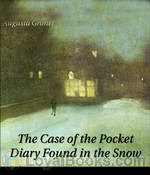 The Case of the Pocket Diary Found in the Snow
The Case of the Pocket Diary Found in the Snow
The account of some adventures in the professional experience of a member of the Imperial Austrian Police. (from the text) | |
By: Harold MacGrath (1871-1932) | |
|---|---|
 The Drums of Jeopardy
The Drums of Jeopardy
The Drums of Jeopardy is a 1920 American novel by Harold MacGrath. The story was serialized by the The Saturday Evening Post beginning in January of 1920.In 1922 the book was made into a Broadway play and the following year a motion picture. A second film version appeared in 1931.It is said that a young Boris Karloff, who previously had a few uncredited film roles, chose his stage name for his first screen credit in 1920 from a Russian mad scientist character named “Boris Karlov” in this novel... | |
 The Pagan Madonna
The Pagan Madonna
The Pagan Madonna, one of Harold MacGrath's numerous novels, set in Shanghai, tells a story of intrigue, murder, and illicit art “collecting.” The paths of Jean Norman, a Red Cross nurse from the United States, Ling Foo, a shifty pawn shop keeper, and Anthony Cleigh, millionaire art collector, cross and recross in growing intrigue over a string of beads. It is a world where “. . . every move you make is governed by Chance--the Blind Madonna of the Pagan . . . .” (Introduction by Don Jenkins) | |
 The Lure of the Mask
The Lure of the Mask
| |
 The Adventures of Kathlyn
The Adventures of Kathlyn
| |
 The Princess Elopes
The Princess Elopes
| |
 Half a Rogue
Half a Rogue
| |
 Arms and the Woman
Arms and the Woman
| |
 Hearts and Masks
Hearts and Masks
| |
 Parrot & Co.
Parrot & Co.
| |
 A Splendid Hazard
A Splendid Hazard
| |
By: Horace Walpole | |
|---|---|
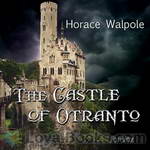 The Castle of Otranto
The Castle of Otranto
The Castle of Otranto is a 1764 novel by HoraceWalpole. It is generally held to be the first gothic novel,initiating a literary genre which would become extremelypopular in the later 18th century and early 19thcentury. Thus, Castle, and Walpole by extension isarguably the forerunner to such authors as AnnRadcliffe, Bram Stoker, Daphne du Maurier, andStephen King. | |
By: Roy J. Snell (1878-1959) | |
|---|---|
 The Blue Envelope
The Blue Envelope
A mystery and adventure story for girls set in Alaska. | |
By: Warner Van Lorne | |
|---|---|
 Wanted – 7 Fearless Engineers!
Wanted – 7 Fearless Engineers!
A great civilization’s fate lay in Dick Barrow’s hands as he led his courageous fellow engineers into a strange and unknown land. None of them knew what lay ahead–what dangers awaited them–or what rewards. But they did not hesitate because the first question asked them had been: “Are you a brave man?” | |
By: Marie Belloc Lowndes (1868-1947) | |
|---|---|
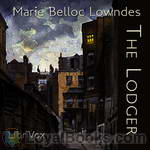 The Lodger
The Lodger
The Lodger by Marie Belloc Lowndes was inspired by the Jack the Ripper murders. An older couple, the Buntings, are forced to take in lodgers to make ends meet. They are on the verge of starvation when a mysterious man, Mr. Sleuth, appears at their door and asks for lodging, paying in advance. However, when the murders of young women in London attributed to a man known only as “The Avenger” continue, the Buntings, particularly Mrs. Bunting, grow fearful that their lodger may be the murderer. | |
 What Timmy Did
What Timmy Did
| |